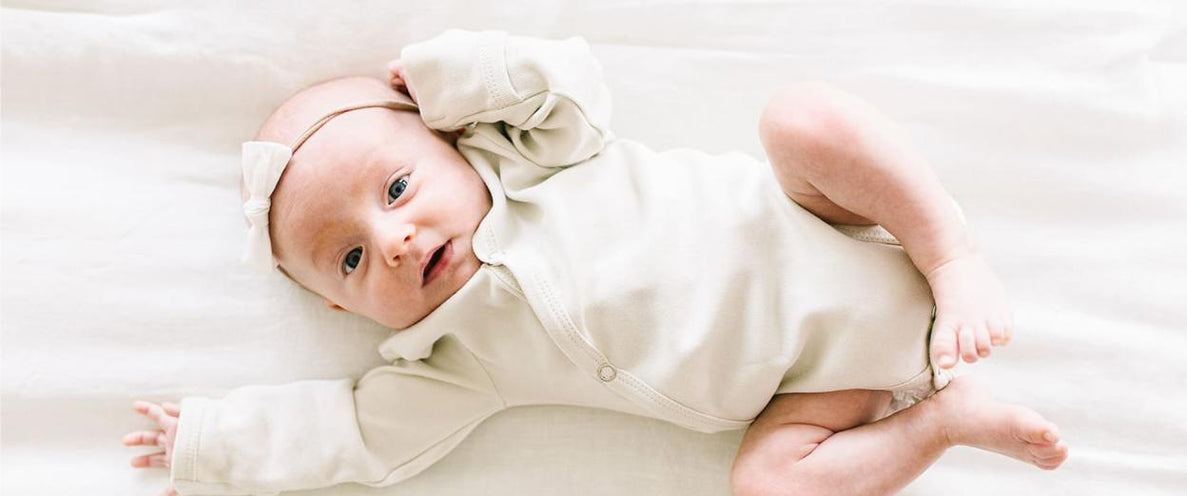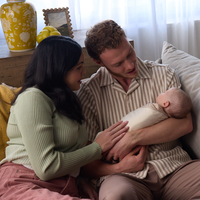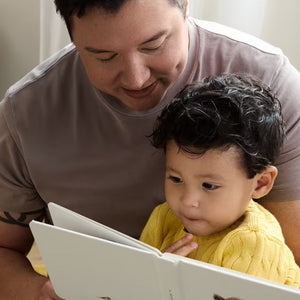The first month of caring for your newborn (and yourself) is full of lots of love and learning. So much of your one month old’s day is full of feeding, diapers, and sleep. I’d love to share a one month old sleep schedule and answer some common questions I get about weeks 4, 5, 6, and 7.
Parents, when you read this, I want you to really hear my heart. I know that those first weeks and months can be exhausting. When I talk about a one month old sleep schedule, I want you to know that my motto is “flexible routine, not rigid schedule.” We want to meet your baby right where they are developmentally. So, what does that look like? Let me show you the basics.
1 Month Old Sleep Guidelines
Every baby is unique and your little one’s day will depend on when your baby wakes, how long your baby naps, and individual cues. During the newborn months, it’s okay and to be expected that naps will vary quite a bit each day. These age-appropriate guidelines are not intended to be a rigid schedule, simply a guide for setting up a flexible routine.
Daytime Feedings: Every 2-3 hours
Sweet Spot Bedtime: 7-8pm or 8-10pm depending on your baby
Number of Naps: 5-8
Wake Windows: 50-90 minutes
For more details on these recommendations, keep reading.
If you want to see everything step-by-step and with all my best tips, check out my Newborn Sleep Bundle. I’ll teach you everything you need to know to lay a healthy sleep foundation during your baby’s first month and beyond. My goal is to give you the tools you need to work towards great sleep.
What is a sample schedule for a 1 month old?
A schedule for a 1 month old is going to vary day to day. One month old’s schedules truly need to be flexible based on a baby’s different nap lengths, wake windows, and feeding intervals. Here is a sample schedule of how a day might look with a one month old:

Text version of 1 Month Old Sample Schedule
| Time | Activity |
|---|---|
| 7:00am | Wake and feeding |
| 8:00 - 9:00am | Nap |
| 9:30am | Feeding |
| 10:00am - 12:00pm | Nap |
| 12:30pm | Feeding |
| 1:00 - 2:15pm | Nap |
| 3:00pm | Feeding |
| 3:20 - 4:30pm | Nap |
| 5:00pm | Feeding |
| 5:40 - 6:05pm | Nap |
| 7:00pm | Feeding |
| 7:25pm | Bedtime |
What are wake windows for a 1 month old? Are wake windows the same for a 4 week old and 6 week old?
A wake window is the amount of time your baby is awake between one nap and the next. It's important to know that wake windows are simply typical ranges that vary from baby to baby. At one month, we see wake windows that are around 50-90 minutes. Wake windows for 4 week old babies are going to be closer to 50-70 minutes, while wake windows for 6 week old babies are around 55-80 minutes. Then, as they reach 7 weeks old or older, wake windows might be closer to 60-90 minutes. Usually, we see that babies have shorter wake windows in the morning and longer wake windows before bedtime.
Wake windows for 4, 5, 6, and 7 week olds are great guidelines, but I also want you to watch for sleepy cues. Sleepy cues are the signs your baby uses to communicate that they're tired, ready for a nap, or overtired.

How much total sleep should a 1 month old have? How long should a 1 month old sleep?
Rather than worrying about the perfect number of hours, we are going to follow your baby’s lead. We’ll want to:
-
Not let any one nap go longer than two hours
-
Aim for wake windows for a 4 week old around 50-80 minutes (and wake windows for a 7 week old around 60-90 minutes).
-
Keep the length of your baby’s night under 12-12.5 hours (from time in the crib at bedtime until time out of the crib to start the day, including any time spent feeding during the night.).
How long should a 1 month old nap? What is a good nap for a 1 month old? Can a 1 month old nap too long?
At one month old, it’s common for naps to be anywhere from 20 minutes to 120 minutes. I talk all about newborn naps in my blog Short Naps and Newborns.
I know that you’ve probably heard the phrase “never wake a sleeping baby.” But, there are actually times when you will want to wake your baby. If your one month old is napping for two hours, we do want to wake them and offer a feeding. Prioritizing daytime calories helps babies get on track with their days and nights, stay on their growth curve, and start working toward a longer stretch of sleep at night.
When is bedtime for a 1 month old?
There isn't a universal answer to this. Some one month olds do best with a 7:00-8:00 pm bedtime. These newborns, when kept up past 8:00 pm, start to become fussy and overtired. On the other hand, some one month olds are content later in the evening and thrive with a bedtime between 8:00 and 10:00 pm. These later-bedtime babies often treat any attempt at an earlier bedtime like a nap. It’s all about finding what works best for your baby.
What are developmental milestones for a 1 month old?
When we talk about milestones, remember that some babies reach them sooner and other babies take a bit longer. Milestones happen in a range, and we aren’t going to compare your sweet baby to the baby next door. If you have any questions about your one month old’s development, please reach out to your pediatrician.
Here are a few things that you might start seeing around 4, 5, 6, or 7 weeks:
-
Bringing their hands to their face
-
Using their eyes to track moving objects that are 8-12 inches away
-
Turning towards familiar voices
-
Briefly holding their head up from a flat surface or from being held
-
Reacting to loud noises
-
Briefly grasping and holding objects with their hands
Is there a sleep regression at 1 month old?
When we talk about regressions in baby sleep, what we are really talking about are progressions in development that make sleep tricky for a short period of time. At one month old, your baby is constantly learning about the world around them, and sometimes this can make sleep difficult. Consider these blogs for common struggles in the first few months:
-
Day-Night Confusion: Some newborns can experience day-night confusion during weeks 4, 5, 6, and 7. You may notice your baby is wanting to sleep all day and be up all night. I know that this can be exhausting for new parents, and it doesn’t have to last forever.
-
Is your newborn feeding every hour and not sleeping?: When your baby is snacking all day, it can make nights tricky. We really want to be responsive to hunger cues and aim for feedings about every 2-3 hours throughout the day to help your baby get good, full feedings instead of snacking.
-
Active Sleep and Newborns: Newborns can be really active in their sleep. Sometimes we can unintentionally wake our babies. We see them moving or even making noise and assume that they are awake, while they are actually sleeping.
-
How do I get my newborn baby to sleep in a crib?: If it seems like the only place your newborn sleeps is in your arms, you're not alone. Please know that sometimes we have be intentional about helping your baby to sleep in the crib or bassinet.
What are some 1 month old baby activities?
I know that it can be tricky to add active awake time for your one month old. It can feel like feeding takes up most of that time. I don’t want you to stress. Do you know the best toy for that baby? You! Babies love that face-to-face interaction and can learn so much from you talking, holding, and staring into their sweet little face. Here are more activities for one month olds:
-
Make silly faces. Even just looking into your newborn’s eyes promotes bonding and development.
-
Talk to your baby. Not feeling creative? That’s okay! Simply narrate whatever you’re doing with your baby or around the house.
-
Enjoy high-contrast items in your home. Have a ceiling fan? The high contrast between the fan and the ceiling makes these a huge hit with one month olds.
-
Practice turning towards your voice. While sitting next to your baby, say their name. This encourages them to turn towards the sound of your voice.
-
Try a play mat. Lay your baby on a play mat and let them gaze at toys hanging above them or kick at something by their feet. They won’t be intentionally hitting (or kicking) anything quite yet, but giving them the freedom on the floor to explore is a great way to play.
I have some favorite toys for a one month old here.
Expert Tip: One important activity to incorporate into your baby’s awake time is tummy time. The American Academy of Pediatrics recommends 15-30 minutes of tummy time for babies by the time they reach 7 weeks.
What is a bedtime routine for a 1 month old?
It’s never too early to start a bedtime routine. Even before your baby can recognize the routine, there is value in the calming impact of a bedtime routine. This sets the tone for everyone going into bedtime and avoids overstimulating your baby. For babies who experience the witching hour, this can be such a great tool. Bedtime routines don’t have to be complicated. A simple bedtime routine for a one month old can be as easy as changing a diaper, feeding, singing a lullaby, swaddling, and then laying your baby down in the crib or bassinet.
Should I swaddle my 1 month old?
Swaddling can be so helpful for babies. It mimics that warm, secure feeling that they had in the womb. I designed the b.e.s.t swaddle for a smooth womb-to-room transition. It’s buttery soft and breathable fabric, easy to use, has a silent-seal closure, and can be used three different ways for swaddling. It even comes with a free mini class to give you the tools to help your little one love the swaddle.
If you want to learn all about swaddle safety and benefits (along with the research behind it), check out my blog called Should I Swaddle My Baby?. If you need more help with the logistics of swaddling or choosing the best swaddle for your baby, let me teach you how to swaddle your baby.
Safety Tip: It’s important to note that it’s time to stop swaddling when your baby shows signs of rolling (True signs of rolling are very rare at one month old.).
Can a 1 month old sleep on their stomach or side?
For your baby’s first twelve months, we’re always going to lay them down on their back for sleep, as this is the safest position. Now, some newborns may roll to their side, due to an involuntary muscle flexion called the newborn curl. Please know, there is no need to obsessively wake in the night, but if you happen to wake in the night and see your baby in the newborn curl, gently roll them onto their back. This normal newborn physiological response typically disappears after several weeks.
Can my 1 month old sleep with a pacifier?
Absolutely! The benefits of pacifiers are huge, and they can be such a great tool to help your baby sleep well. Check out my blog on newborns sleeping with pacifiers. I'll address your concerns about breastfeeding and pacifiers, how to introduce a pacifier to your 4, 5, 6, or 7 week old, and what to do if your baby becomes overly dependent on the pacifier for sleep.
My 1 month old baby is sleepy all day and doesn’t want to wake up to eat. Is this normal?
It can be. Let’s talk about how to help if your one month old doesn’t seem interested in waking to eat during the day:
-
If your baby is often drifting to sleep during those important daytime feedings, we want to help your sleepy eater stay awake during feedings.
-
If your baby is sleeping all day but is awake all night, we want to correct day-night confusion.
-
If your baby is waking every hour during the night to eat, we want to try to correct your newborn’s reverse cycling and really target full feedings during the day.
If you have any concerns about your baby’s overall intake or if they seem lethargic and very hard to wake, be sure to talk with your pediatrician.
What should my 1 month old wear for sleep?
That depends on the temperature of your home and your climate. Overheating can be dangerous, and cold babies just don’t sleep well. We want your one month old to be at a comfortable temperature. For some, a diaper and a swaddle is enough; for others, a diaper, onesie, and a swaddle is perfect; and for colder homes, perhaps a diaper, footie pajamas, and a swaddle is just right. My blog on how to dress your baby for sleep goes into even more detail for you.
The b.e.s.t swaddle has three ways to swaddle and can help you keep your baby swaddled at a comfortable temperature. In warm environments, the inner band alone is the perfect option. In cooler temperatures, the breakout-proof option will give the warmth they need.
How do I get my 1 month old to sleep?
We often think that babies will just sleep when they are tired and that sleep comes naturally to newborns. The truth is that sometimes we have to help newborns learn how to be great little sleepers. My Newborn Sleep Bundle will help you set your days and nights up for success, learn your baby's cues, calm a fussy baby, and so much more. I want to help you lay a healthy sleep foundation for your baby and love the newborn stage.
When do babies start sleeping through the night?
I know that you want to hear a specific age for when babies start sleeping through the night. But, the truth is that it’s different for every baby.
Once your pediatrician has given you the clearance to no longer wake your baby for night feeds, the longest stretch between feedings would be their age in weeks plus one hour. So, for a 4 week old, we wouldn’t want their longest stretch to exceed 5 hours before offering a feeding. After that longer stretch, your newborn will likely need feedings every 2-3 hours for the rest of the night.
At 4 weeks, most babies will need to wake to eat about three to four times during the night. You may see that decrease to two to three feedings around the time your baby is 7 weeks old.
Please know, you don’t have to do this alone. My newborn class will provide you with the tools you need to set your days and nights up for success, read your baby’s cues, work towards those longer stretches of night sleep, and love the newborn stage.
Already have a 2 month old? I've got you covered with my 2 month sleep schedules.








